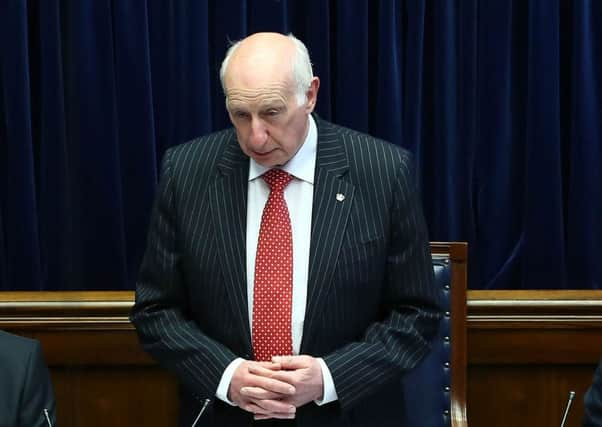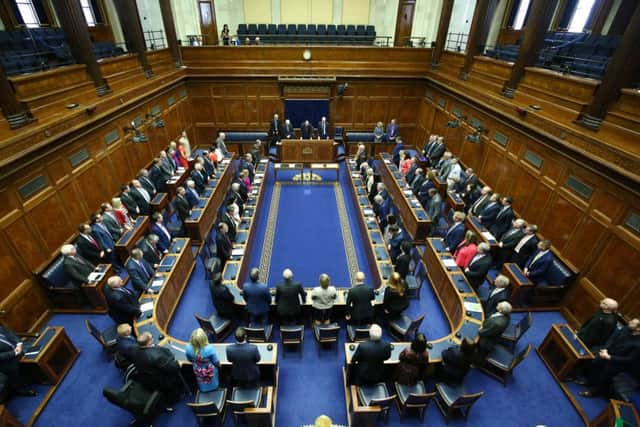Sam McBride: Stormont's Speaker problem a ticking time bomb for Assembly


Until now, the relatively cosy nature of the Stormont set-up where all but a handful of MLAs were members of parties in the government meant that the distinction between the executive and legislative branches of government was blurred. That saw the Assembly often act in an openly deferential way to the Executive.
In such a context, there was limited scrutiny of the man who is meant to represent the interests of the legislature where it finds itself in conflict with the Executive – the Speaker.
Advertisement
Hide AdAdvertisement
Hide AdThe blurred lines manifested themselves in situations where an Executive minister said he could not attend the Assembly to answer an urgent oral question and the Assembly Speaker’s (metaphorical) response was a resigned shrug of the shoulders, perhaps along with a mild admonishment.


By contrast, Westminster ministers – right up to the prime minister – are hauled to the Commons by the Speaker. Unsurprisingly, the Commons is therefore seen as a key theatre in which the Government is held to account.
But a core difference in how the Speaker is chosen and how he operates at Stormont has the potential to increasingly undermine the Assembly as the chamber in which ministers are held – and, crucially, are seen to be held – to account.
Unlike Westminster and the Dail, the Speaker does not sever all ties with their party.
Advertisement
Hide AdAdvertisement
Hide AdMr Newton’s constituency office, website and social media accounts make clear that he remains a DUP MLA.


That led to the recent situation where, as Mr Newton faced difficult questions about the nature of his links to Charter NI, the Assembly’s neutral civil service press officers initially answered questions on the Speaker’s behalf but then told journalists that future questions should be put to the DUP. It would be inconceivable for Commons Speaker John Bercow to ask that questions be submitted to the Conservative Party or for Dail ceann comhairle Seán Ó Fearghaíl to have questions handled by the Fianna Fáil press office.
But then, both of those politicians severed all ties with their parties once elected by their legislatures. Both Mr Bercow and Mr Ó Fearghaíl are the first Speakers in their legislatures to have been elected by secret ballot, a move towards a system which makes it very difficult for political parties to whip their members into voting for their chosen candidate.
By contrast, Stormont’s Speaker is effectively decided in private by the DUP and Sinn Fein who rotate the role and instruct their MLAs how to vote to ensure that their candidate wins.
Advertisement
Hide AdAdvertisement
Hide AdMr Newton is no doubt doing his best to be impartial – and he has far more limited associations with his party than that of the typical MLA – but there is a fundamental problem when an MLA who remains a member of the government party sits as the representative of the body which is meant to be vigorously scrutinising the government.
The Speaker is also left at a profoundly unfair disadvantage in having the responsibility of representing a constituency while being stripped of most of the tools with which to do so. He cannot use the media or the Assembly to criticise a government department, he cannot table Assembly questions and he cannot advocate for any constituent whose predicament could become the subject of political controversy.
Those problems are exacerbated if Mr Newton wants to stand in the next election. To do so, he will have to convince Arlene Foster, as nominating officer of the DUP, to choose him as a DUP candidate, yet as Speaker he may well come into conflict with Mrs Foster. It may be that the 70-year-old Mr Newton (as happened with his predecessor, Mitchell McLaughlin) has no intention of standing again; but the problem has already arisen – Willie Hay was Speaker from 2007 to 2011 prior to deciding to stand again and fighting an election as a DUP MLA before then returning as Speaker.
This may seem something of an esoteric problem. But the consequences of a Speaker being perceived to be favouring one political party – which is the constant pitfall in front of every Speaker under the current arrangements – would be devastating for the credibility of the Assembly.
Advertisement
Hide AdAdvertisement
Hide AdDespite the furore over Charter NI, that has not yet happened in the wider public consciousness. But, with the creation of a significant opposition within the Assembly, the Speaker is coming under more pressure than ever before and it may only be a matter of time until those sorts of accusations are being openly made by the Opposition. Even if they are unfounded, the Speaker is at an immediate disadvantage in defending his position while he remains a member of a government party.
And the Speaker’s wide powers extend far beyond calling debates to order. He has the power to block legislation if he believes that it is outside the powers of the Assembly, to refer ministerial decisions (or not refer them) to the Executive – where they may be blocked by either the DUP or Sinn Fein – and to select which amendments to bills can be debated in the chamber.
His position is given exceptional protection from Assembly scrutiny, whereby comments on the character or the actions of the Speaker may be punished as breaches of privilege.
There were radical attempts to address this last year, put forward in John McCallister’s ground-breaking opposition bill. But while that legislation succeeded in creating the structures for an official opposition, its proposals to reform the Speaker’s role were overwhelmingly rejected by MLAs.
Advertisement
Hide AdAdvertisement
Hide AdIronically, given that the UUP and SDLP now find themselves coming into conflict with the Speaker, both of those parties were dismissive of most of the reforms proposed for the Speaker’s role.
Only Alliance fully endorsed Mr McCallister’s proposals on the issue.
The most unpopular – but arguably necessary – aspect of Mr McCallister’s proposals would have seen the Speaker removed from being a constituency MLA and allowed his party to co-opt someone to take his place, something which would have brought with it a financial cost. He also proposed a legislative requirement that the Speaker break ties with his party and the introduction of a secret ballot for the election of the Speaker.
That would have been different to the situations in Westminster and in the Oireachtas, but far closer to them in spirit than the current arrangement.
Advertisement
Hide AdAdvertisement
Hide AdThe proposals were imperfect – the DUP pointed out that a secret ballot could see unionists and nationalists simply voting against each other, thus ensuring that “it will always be someone from the Alliance Party”, while Sinn Fein feared that such a system had the potential to exclude them.
In the end Stormont effectively resolved to do nothing. While as recently as the start of this year when the bill was making its way through the Assembly the issue seemed somewhat academic, the numerous flaws in the current arrangements are now starting to dawn on some MLAs.